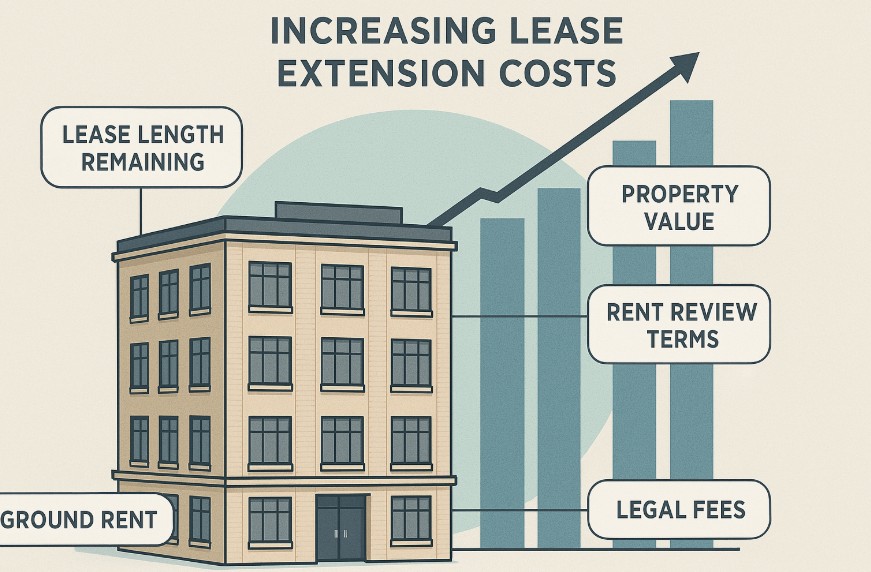How Much Does It Cost to Extend a Lease?
For leasehold property owners in the UK, the ticking clock of a lease can be a source of growing concern. As time runs down on your lease, the impact on property value, mortgage eligibility, and saleability becomes increasingly severe. Many owners eventually ask: how much does it cost to extend a lease and the answer isn’t straightforward.
The cost depends on a combination of legal, financial, and practical considerations. This comprehensive guide will walk you through everything you need to know about lease extension costs in the UK, so you can plan with confidence and avoid costly surprises.
What Is a Lease Extension?
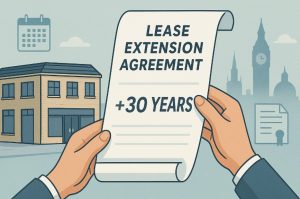
A lease extension is a legal agreement between a leaseholder (the property owner) and the freeholder (the landowner), allowing the leaseholder to extend the duration of their leasehold interest. This is most common with flats and maisonettes in the UK, where the ownership structure typically separates the property from the land it sits on.
In a lease extension:
- For flats: 90 years are added to the existing lease term.
- For houses: It may result in a 50-year extension under separate legislation.
Once extended under the statutory route, the ground rent is reduced to a peppercorn (effectively zero), which benefits the leaseholder in the long term.
Why Does a Lease Extension Matter in the UK?
The UK’s leasehold system has unique implications. Leasehold properties are technically owned for a fixed period only, and as the lease term shortens, several issues can arise:
- Property devaluation: Properties with under 80 years left on the lease lose value quickly.
- Mortgage challenges: Many lenders won’t offer mortgages on properties with leases below 70–80 years.
- Sale difficulty: Buyers are wary of short leases and the costs involved in renewing them.
Extending the lease early protects the property’s market value, makes it easier to remortgage or sell, and helps avoid large future costs associated with “marriage value”.
What Factors Influence the Cost of Extending a Lease?
When extending a business property lease, the cost is influenced by a range of complex and interrelated factors. For commercial properties, lease extensions are often more bespoke than residential agreements, as they may involve negotiations over not just the lease term but also rent reviews, break clauses, service charges, and permitted use clauses. However, some consistent cost influencers still apply.
Lease Length Remaining
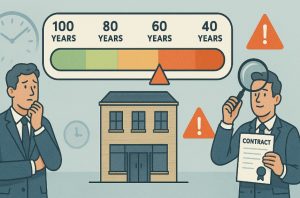
One of the most significant cost drivers is how many years are left on the lease. As the remaining term decreases, particularly if it falls below 80 years, the lease becomes less valuable. This affects the lease premium payable to the freeholder or landlord.
For commercial properties, a lease nearing expiry may also trigger automatic rent reviews or renewal negotiations under the Landlord and Tenant Act 1954, which can introduce additional legal and valuation complexities.
Property Value and Use
The open market rental and capital value of the business premises directly impacts the lease extension cost. Higher-value commercial properties in prime locations such as city centres, retail parks, or industrial hubs—typically attract a higher lease premium.
The intended use (e.g., office, retail, hospitality) may also affect negotiations, especially if there is potential for redevelopment or conversion.
Ground Rent and Rent Reviews
While ground rent is more commonly associated with residential leases, some older commercial leases may still carry a nominal ground rent obligation.
More commonly, rent review clauses influence the renewal negotiations, especially in full repairing and insuring (FRI) leases. The cost to extend or renew the lease may reflect expected uplifts in rent through periodic review mechanisms.
Statutory vs. Contractual Rights
Businesses with protected leases under the Landlord and Tenant Act 1954 have the right to renew on fair terms. However, leases “contracted out” of this Act do not have this automatic protection, making the extension process riskier and often more costly due to potential repositioning or change-of-use plans by the landlord.
Legal and Professional Involvement
Valuers, solicitors, and possibly dispute resolution professionals will be involved. Their fees can be substantial, particularly if the lease terms are being restructured or if negotiations are protracted.
Commercial lease extensions may require specialist surveyors with RICS accreditation, particularly for accurate valuation and negotiation with institutional landlords or investment companies.
What Are the Typical Costs Involved in a Lease Extension?
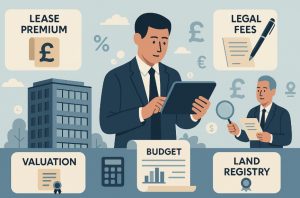
Extending a commercial lease involves both direct financial costs and associated legal expenses, and it’s important to plan for both. Unlike residential leases, commercial lease costs can vary dramatically depending on the size of the premises, the value of the leasehold interest, and the specifics of the business’s operational needs.
Key Cost Components:
- Lease Premium: The principal cost paid to the landlord or freeholder to compensate for the extended term and any lost reversionary interest. For high-value business premises, this can exceed £50,000 or more depending on location and lease length.
- Valuation Fees: A professional leasehold valuation is essential to establish a fair market premium. A business should budget £500 to £2,500+ depending on property size and location.
- Legal Fees: A commercial lease solicitor is required to draft and review the lease extension terms. This includes checking clauses, renewal rights, rent review terms, and compliance with statutory protections. Legal costs usually range from £1,000 to £3,000+.
- Landlord’s Costs: Under most lease agreements, the tenant is expected to cover the reasonable costs of the landlord’s legal and surveyor fees. These are often negotiable but must be anticipated.
- Land Registry and Filing Fees: These administrative costs are minor compared to other expenses but still apply, typically around £40 to £540.
For long leases or those involving substantial properties (e.g., mixed-use developments, multi-storey offices), the total lease extension process could exceed £100,000 when all costs are considered.
What Is the Statutory Lease Extension Process and How Much Does It Cost?
For qualifying business leases, particularly under the Landlord and Tenant Act 1954, tenants are granted statutory rights to renew or extend their leases. This framework is designed to protect tenants from being forced out at lease expiry, assuming they meet certain criteria.
Eligibility Criteria
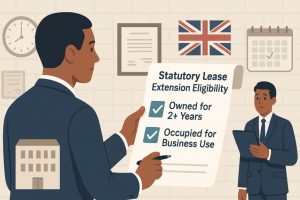
The tenant must occupy the property for business purposes and must not have explicitly agreed to contract out of the 1954 Act in the original lease. If eligible, the tenant has the right to request a new lease on fair and reasonable terms, including market rent and updated clauses.
Process Overview
- Section 26 Request (by tenant) or Section 25 Notice (by landlord) initiates the process.
- Valuation and Lease Drafting: A valuer assesses the market rent and premium (if applicable), and solicitors draft the new lease.
- Negotiation Period: Both parties negotiate the terms. If unresolved, the matter can be escalated to the County Court for resolution.
- Lease Completion: Once terms are agreed or ordered, the new lease is executed and registered.
Cost Implications
The cost under the statutory route is generally lower than informal extensions, as it’s based on market rent rather than speculative or inflated demands. However, legal and valuation fees can still range from £5,000 to £15,000+, particularly in contentious renewals.
How Does an Informal Lease Extension Work and Is It Cheaper?
Informal lease extensions also known as contractual negotiations which take place outside of statutory protection and are purely at the discretion of the landlord. In the commercial property world, this is common when leases are short or where both parties want flexibility in negotiating new terms.
While this route can be faster, the cost is often more unpredictable and may be higher in the long run due to unfavourable clauses that aren’t subject to statutory fairness.
Key Characteristics:
- Terms are agreed entirely between landlord and tenant.
- Ground rent or rent reviews may be retained or increased.
- The lease may contain stricter user clauses or early break options.
Is It Cheaper?
Not necessarily. While some landlords offer incentives to renew early (e.g., rent-free periods, contribution to fit-out costs), many will demand premium payments or significantly higher rent adjustments. Without legal protection, tenants face the risk of reduced negotiating power and fewer remedies if the landlord changes course.
How Much Could You Expect to Pay for Lease Extensions in Different Scenarios?
To offer context, let’s explore example scenarios with varying lease lengths and property types.
| Scenario | Lease Premium | Total Estimated Cost |
| Office lease with 85 years remaining | £10,000 – £20,000 | £15,000 – £25,000 |
| Retail unit with 70 years remaining | £20,000 – £35,000 | £25,000 – £40,000 |
| Industrial unit below 60 years | £40,000 – £80,000+ | £50,000 – £100,000+ |
| Prime Central London business lease | £100,000+ | £120,000 – £200,000+ |
The specific cost depends on market conditions, rent review projections, and any redevelopment value the landlord might lose by extending your lease.
How Can You Calculate the Cost to Extend Your Lease?
Calculating the cost of extending a business lease requires expert input due to the nuances involved. While residential lease extension calculators offer rough estimates, commercial leases are far too complex for generic tools.
Key Steps:
- Commission a RICS Valuation: A qualified surveyor assesses the lease’s current and reversionary value, rent, and location impact.
- Solicitor Consultation: They review renewal rights and landlord expectations under statutory or contractual frameworks.
- Review Comparable Transactions: Analysing similar lease extensions in the area helps benchmark costs.
- Consider Additional Clauses: Rent reviews, service charges, user restrictions, and dilapidation obligations must be factored in.
This process gives a more accurate projection of premium payable and all associated costs, enabling more strategic budgeting.
What Strategies Can Help Reduce Lease Extension Expenses?
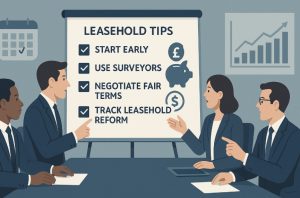
While lease extensions can be costly, strategic planning can help manage and reduce the total outlay:
- Negotiate Early: Approaching your landlord well in advance of expiry puts you in a stronger position and may result in better terms.
- Avoid Contracting Out (if possible): Retaining rights under the 1954 Act ensures you can use statutory mechanisms, which offer more predictable outcomes.
- Use Expert Representation: Experienced surveyors and solicitors may secure fairer terms and lower premiums through skilful negotiation.
- Consider Incentives: In some cases, landlords may offer contributions to fit-out costs, rent-free periods, or step-up rent increases to reduce upfront payments.
- Group Lease Extensions: In mixed-use commercial properties, multiple tenants may negotiate together to achieve better pricing or landlord flexibility.
How Does a Lease Extension Affect Your Mortgage Options?
For businesses using their property as collateral or operating under a commercial mortgage, the lease length directly affects lending terms. A shorter lease may limit the ability to:
- Secure new finance
- Refinance at favourable rates
- Access working capital loans tied to the property
Most commercial lenders require at least 25–30 years remaining on the lease to match standard commercial mortgage terms. If the lease is too short, banks may refuse lending, require higher deposits, or increase interest rates.
Extending your lease can significantly improve your financing options, allowing you to restructure debt, invest in the premises, or expand operations with confidence.
What Should You Keep in Mind When Planning a Lease Extension?
Extending a business lease is more than a legal formality, it’s a strategic investment decision. Consider the following when preparing for the process:
- Start early: Begin planning at least 18–24 months before lease expiry to maximise your negotiating power.
- Understand your position: Know whether your lease is inside or outside the 1954 Act.
- Budget realistically: Include legal, valuation, and potential rent increase scenarios in your financial forecast.
- Assess long-term goals: Will the property continue to meet your business’s needs during the extended term?
- Consult professionals: Leasehold surveyors, property solicitors, and financial advisors can help navigate this high-stakes process.
Careful planning ensures you’re not caught off guard by costs, while positioning your business for stability and growth in its current location.
FAQs
Can I extend my lease at any time?
Yes, but to qualify for a statutory extension, you must have owned the property for at least two years.
What happens if my lease drops below 80 years?
Costs increase sharply due to marriage value, and property value typically drops.
Is a statutory lease extension always better?
Not always—but it provides legal protections that informal extensions lack.
Who pays the freeholder’s costs?
Under the statutory process, the leaseholder typically pays the freeholder’s reasonable legal and valuation fees.
Can I remortgage before extending my lease?
It depends on the lender. Some require a lease extension first, especially under 75 years.
How long does a lease extension take?
Usually 3–12 months, depending on the process chosen and freeholder cooperation.
Will leasehold reform impact extension costs?
Yes, the government is working on changes to simplify and reduce costs for leaseholders.

